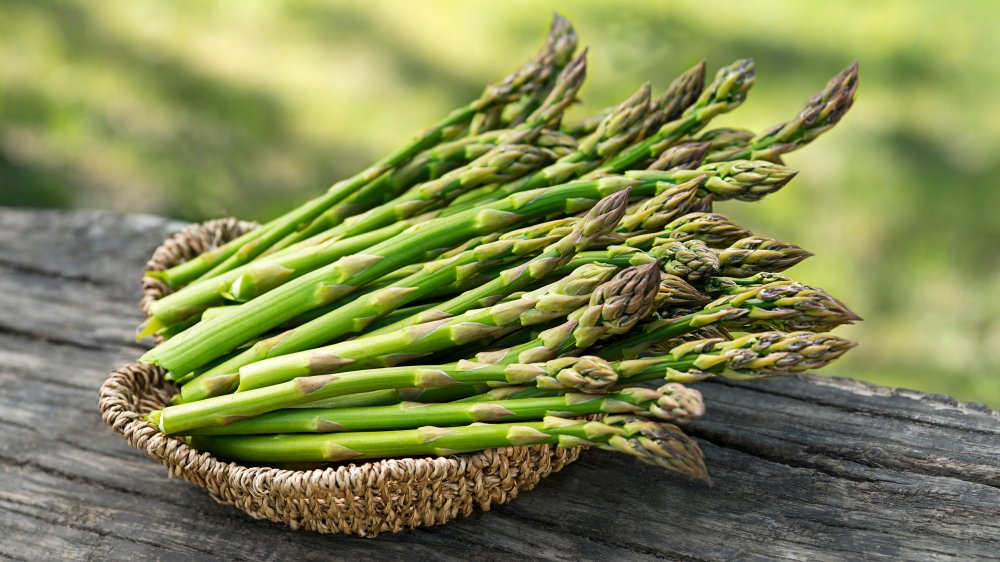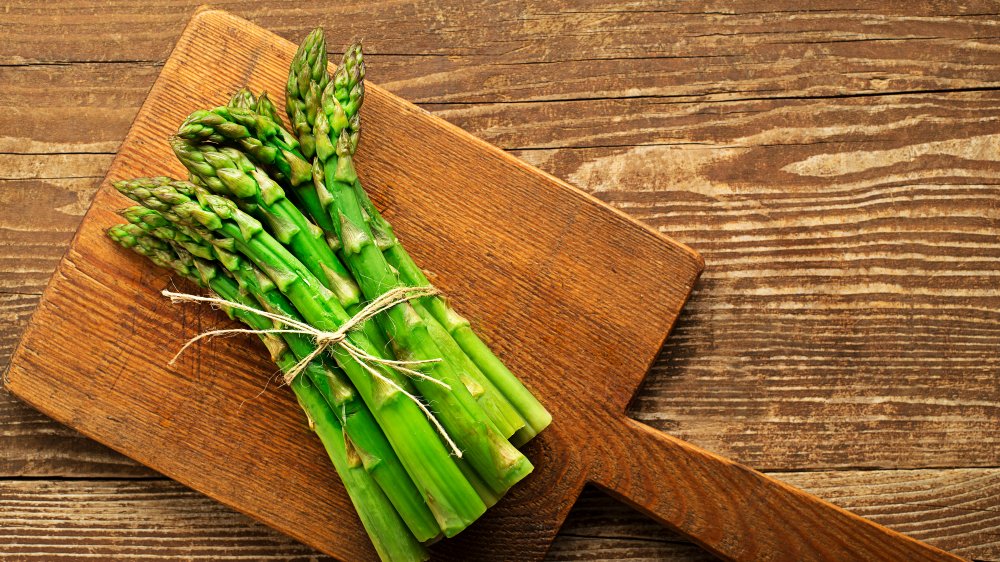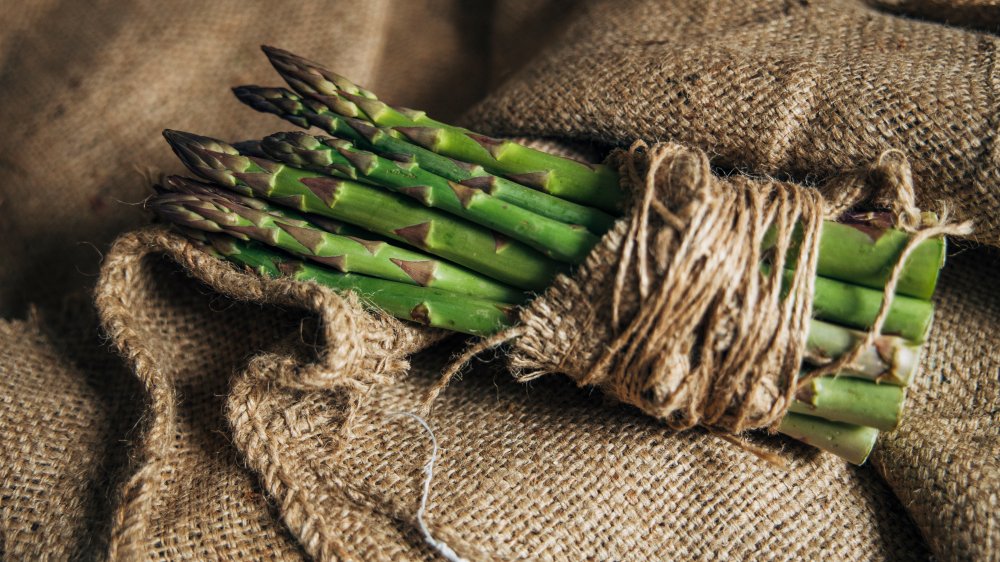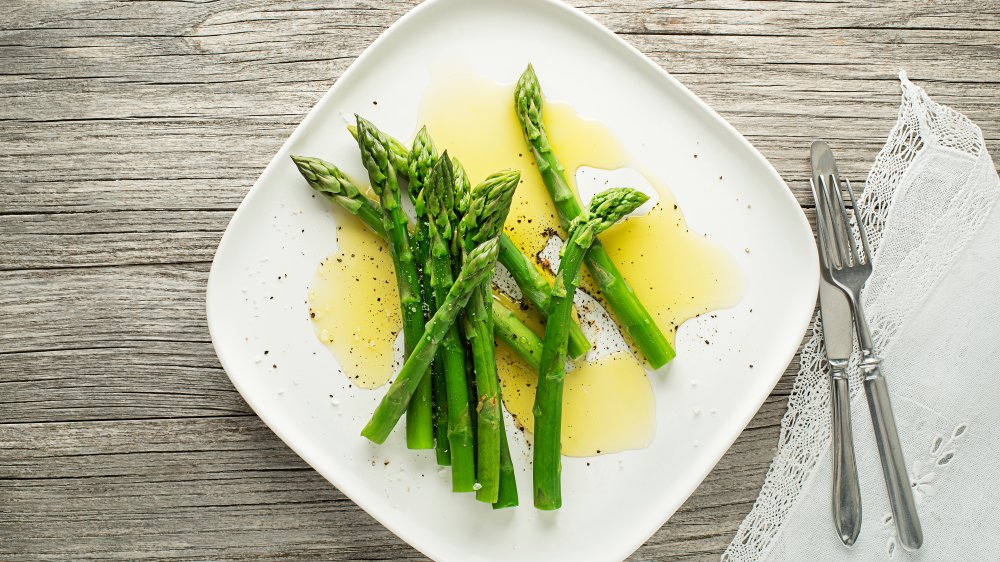The Untold Truth Of Asparagus
Asparagus is one of those vegetables that people either love or hate. This stalky little guy hosts tons of nutritional benefits for the body with an added, somewhat smelly, side effect. According to Cultures de Chez Nous, asparagus is quite old and has provided benefits for ancient cultures, ranging from the Egyptians to the Romans to the Greeks. A simple Google search can muster up a plethora of articles that boost anything from diet plans that incorporate this green little guy to recipes of it being wrapped in bacon or thrown into a stir fry, or even how to properly steam it.
Despite being able to find asparagus all year (due to shipments from countries like China, Peru, and Germany), The Spruce Eats explains that asparagus is actually a seasonal veggie. Being that it's so readily available, we bet you're wondering why asparagus is a little pricier than your run-of-the-mill vegetable? According to The Spruce Eats, despite increased availability, its elite seasonal status still applies regardless of when you buy it.
Asparagus was once seen as an aphrodisiac
The humble asparagus can be traced back several centuries, according to Cultures de Chez Nous. It is reported that the plant originated from eastern Mediterranean countries and has remnants of wild varieties that can be found in Africa as well. The ancient Egyptians were said to cultivate asparagus as an element to offer up to their gods as well as use it for medicinal purposes, as The Kitchen Project details. The ancient Romans were also said to have cultivated asparagus and produced several varieties in their gardens dating as far back as the first century AD.
The ancient Greeks considered asparagus an extremely sacred plant and believed it to have aphrodisiac virtues, according to Cultures de Chez Nous. Like the many civilizations that cultivated asparagus, the Greeks had a keen interest in its biological and pharmaceutical properties, as the plant contains diuretic properties. After the fall of these empires, asparagus fell to the wayside a bit during the Middle Ages but still found some love by the way of Middle Eastern countries. Cultures de Chez Nous details that it wasn't until the 16th century that asparagus experienced a renaissance in France by way of King Louis XIV and the French nobility, but it wasn't until the 18th century that it was reintroduced to common folk.
Asparagus is actually good for you
The Spruce Eats asserts that asparagus is plenty good for you. This herbaceous perennial plant, which happens to belong to the lily family, is a great source of fiber and other nutrients. Live Science explains that asparagus contains high levels of vitamin K, folate, vitamin C, beta-carotene, vitamin E, zinc, manganese, and selenium. San Diego-based nutritionist Laura Flores tells Live Science that asparagus contains a variety of anti-inflammatory and antioxidant nutrients. Live Science also reports that asparagus also contains the amino acid asparagine, which is a fancy nutrient that helps with brain function.
Asparagus is reported to also help with maintaining insulin levels because of its trace levels of chromium. The same Live Science report also details that the detoxifying nutrient glutathione found in asparagus can assist the body in removing carcinogens. Because of its levels of glutathione, asparagus can help the body better protect itself from cancers like bone, breast, lung, and colon. The cherry on top? Asparagus is just 20 calories per each serving of five spears.
Why does it make your pee smell funky?
The somewhat displeasing smell that appears during your first go to the loo post-asparagus consumption is something that has become a bit of a social phenomenon. You can find lists of articles seeking to explain why it occurs as well as Reddit users holding polls trying to find out how many you can eat before it actually happens. (The consensus was between five and ten spears cooked medium-done). WebMD's nutrition expert Carolyn O'Neil, MS, RD, reveals that asparagus pee occurs because of how the body's digestive system breaks down some of the chemical compounds found within the vegetable. According to Aurora Healthcare, the body breaks down asparagusic acid, a compound that is high in sulfur, and as the digestive process takes place, "volatile" elements affect the smell of pee.
Fear not, O'Neil explains to WebMD that "volatile" is just another word for "airborne," which is why people can smell it. But O'Neil also asserts that studies have shown that not everyone has the ability to smell asparagus pee. Aurora Healthcare explains that around 22 to 50 percent of the asparagus-eating population can smell it. What happens to the rest that can't? Studies suggest they are missing the gene that allows them to. Another fun fact? The smell can occur anywhere between 15 and 30 minutes after eating asparagus.



